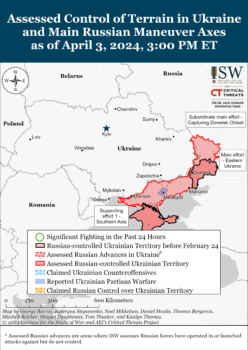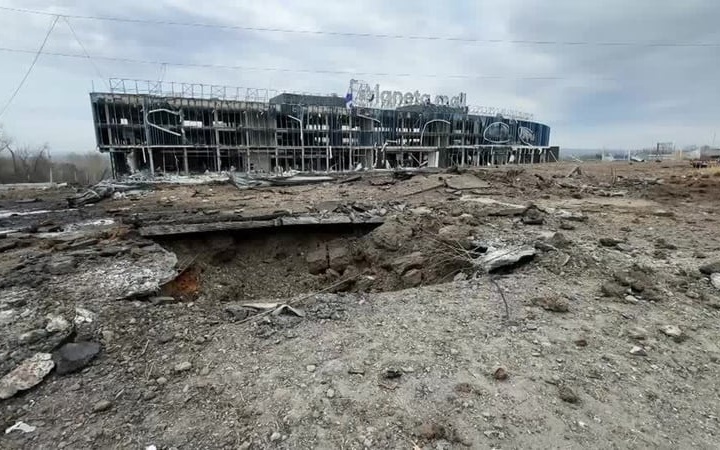8 people were killed in Russia’s missile and drone strikes on Kharkiv in northeast Ukraine, April 6, 2024
Saturday’s Coverage: 6+ Killed, 11 Wounded in Latest Russian Attack on Kharkiv

Map: Institute for the Study of War
UPDATE 1447 GMT:
The toll has risen to five wounded from the latest Russian attacks on Ukraine’s second city Kharkiv.
A 45-year-old man was hit by shrapnel, and four women aged 37 to 72 suffered minor injuries.
The Russians used two glide bombs as well as shells. At least 13 high-rise apartment buildings and private houses, educational institutions, cafes, hostels, hotels, cars, and garages were damaged.
UPDATE 0735 GMT:
Three civilians have been killed in Russian shelling of the village of Guliaipole in the Zaporizhzhia region in southern Ukraine.
Two men and a woman died in the rubble of their house. Another person was injured.
In Kupyansk in the Kharkiv region in northeast Ukraine, Russian shelling of a four-story residential building killed an 85-year-old resident.
UPDATE 0726 GMT:
The US is warning allies about increased support by China of Russia’s invasion of Ukraine, including the supply of geospatial intelligence.
In addition to the satellite imagery for military applications, the Americans cite the provision microelectronics and machine tools for tank production; optics; and missile propellants.
In a recent call, US President Joe Biden told Chinese leader Xi Jinping of his concerns.
UPDATE 0719 GMT:
Ukraine air defenses downed all 17 Iran-type drones fired by Russia overnight.
The Russians also launched a Kh-31 guided aerial missile and a Iskander-M ballistic missile.
In the Kharkiv region, which has been enduring deadly Russian strikes, fragments from a drone injured three people and damaged a private residence.
A 62-year-old man sustained shrapnel wounds, and a 64-year-old woman and 87-year-old man were treated on the spot.
UPDATE 0634 GMT:
Ukraine’s troops say they are facing regular chemical gas attacks from Russia’s invaders.
The soldiers told the Daily Telegraph of small drones dropping CS gas, whose use is banned under the Chemical Weapons Convention.
Russian forces have reportedly used chemical weapons throughout the 25-month invasion, including in its 12-week assault overrunning the port city of Mariupol in southeast Ukraine in spring 2022.
Slava, a senior lieutenant deployed near Lyman in the Donetsk region, said some Ukrainian units endure “almost daily” gas attacks.
Ihor, the commander of a Ukrainian reconnaissance team near the frontline city of Chasiv Yar in Donetsk oblast reinforced, “Nearly every position in our area of the front was getting one or two gas grenades dropped on them a day.”
Rebekah Maciorowski, an American combat medic and a qualified nurse serving in the Ukrainian army, gave the Telegraph a CS gas grenade for verification.
Maciorowski has provided medical aid to Ukrainian soldiers in the three brigades with whom she works in Donetsk after the “systematic” chemical attacks.
The Russians are also reportedly using the gas on the southern front. Mikhail, the commander of an infantry unit deployed in Robotyne in the Zaporizhzhia region, said: “Gas masks saved more than one of our lives.”
Maciorowski said that she gave medical aid last year after an attack where she suspected the use of hydrogen cyanide, a deadly, colorless gas used in World War I.
She said a Russian drone dropped two munitions containing an unknown gas with a “crushed almond aroma” in the Donetsk region.Two people were killed and 12 were hospitalized.
The Russian military has boasted about its use of the banned munitions. In December, the Black Sea Fleet’s 810th Naval Infantry Brigade posed a video of K-51 gas grenades being dropped on Ukrainian positions: “Thanks to the head of the radiation, chemical and biological defense troops… for the weapons provided and their timely delivery.”
A news report on Russia State TV in May 2023 featured a Russian soldier who said, “The enemy decided that using gas masks would help. The gas masks don’t help.”
UPDATE 0618 GMT:
Vladimir Putin has received another boost in Slovakia, where Peter Pellegrini — the candidate of the Kremlin-friendly government of Prime Minister Robert Fico — has won the Presidential election.
Pellegrini triumphed over the liberal opposition candidate and former Foreign Minister Ivan Korčok with 53.85% of the vote.
Fico became Prime Minister after October’s Parliamentary elections and, in the guise of calling for “peace”, supported measures allowing Russia to keep captured Ukrainian territory. In November, Bratislava cut military aid to Kyiv.
In his victory speech, Pellegrini echoed Fico’s position, saying he would “ensure that Slovakia remains on the side of peace and not on the side of war”.
ORIGINAL ENTRY: Ukraine President Volodymyr Zelenskiy has warned that Kyiv might run out of air defense missiles amid Russia’s intense missile and drone assaults and a six-month blockade of $60.1 billion in US aid by Trumpists and hard-right Republicans.
Zelenskiy spoke as the death toll from Russia’s latest strikes on Ukraine’s second city Kharkiv rose to eight.
“If they keep hitting [Ukraine] every day the way they have for the last month, we might run out of missiles, and the partners know it,” he said in the televised interview. “To fully cover our state, even those regions where there are no strikes, we need 25 Patriot systems.”
He was not as pessimistic about the situation on the frontline, where Russia has been trying to seize territory in the east. He said that Ukraine still does not have enough ammunition for a counteroffensive but — with European countries stepping up initiatives to deliver muntions — has started receiving arms from partners for essential defense.
Ukraine commander-in-chief Oleksandr Syrskyi said defenders still hold the town of Chasiv Yar in the Donetsk region, despite sustained Russian attacks with assault groups supported by armored vehicles: “Chasiv Yar remains under our control, and all enemy attempts to break through to the settlement have failed.
However, he acknowledged that the Russians are advancing in the area of Bakhmut — seized by Moscow in May 2023 — and pushing back against them is “difficult”.

